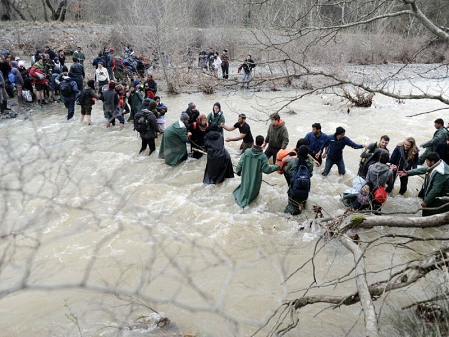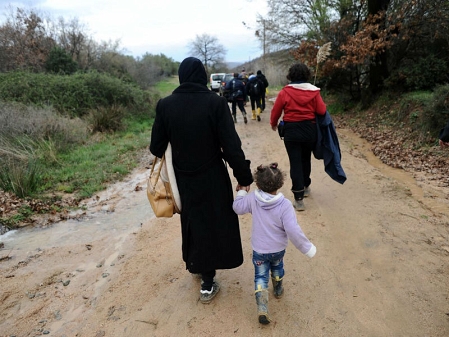Erstellt am: 15. 3. 2016 - 17:10 Uhr
Idomeni: Chaos und Desinformation
Ein Flugblatt hatte gestern zahlreiche Flüchtlinge dazu bewogen, als große Gruppe die Grenze zu überqueren. Und zwar dort, wo es an der griechisch-mazedonischen Grenze keinen Zaun mehr gibt, sondern nur mehr einen Fluss. Mithilfe einer Menschenkette ist das vielen gelungen, doch kurz darauf wurden die meisten von der mazedonischen Polizei abgepasst und wieder nach Griechenland zurückgebracht.

Lena Reiner
Das größte Problem ist derzeit die mangelnde Information und die Gerüchte, die unter den Flüchtlingen die Runde machen. Für viele der Flüchtlinge in Idomeni gäbe es die Möglichkeit weiterzureisen. Mehrheitlich sind nämlich Frauen in Idomeni, und viele von ihnen haben bereits Angehörige in Europa. Zusammenführungen wären daher theoretisch möglich, wenn man in Griechenland einen Asylantrag stellt.
Babar Baloch von der UN-Flüchtlingsorganisation UNHCR ist in Idomeni und beschreibt die Lage einen Tag nach der "großen Flussüberquerung".
fm4.ORF.at: Can you describe the situation - what is going on today?
Babar Baloch: The situation in Idomeni is quite grim and gloomy. It is quite a miserable situation for refugees out there. Our current estimate is, that there are ten to twelve thousand refugees here. And they have been here the last days. The majority of them are women and children. We are talking about at least 4,000 children. The majority of them have been sleeping in the cold in small tents without proper shelter, with four to five days of continuous rain.
Yesterday there were reports of people crossing the border through the river and that many people have been arrested and brought back to Greece. Reportedly a leaflet has caused this movement.
[This crossing of the border] is partly being blamed on a leaflet by the Greek authorities or the police, which was "enticing" the refugees to do that. But we need to understand the whole picture: These refugees here find themselves in a dilemma. They can’t move forward because the border is closed, and they can’t go back where they have come from. So they have been sitting here in these miserable conditions for days and days, and they want to grab any glimmer of hope, even if it’s misleading - and this is exactly what’s happened.
This was not a correct information [on the leaflet], but some of them packed up their bags and moved. But that didn’t end their misery. On the other side they were sent back. We are still trying to check how many of them have returned, where they are and which state they are in. But clearly: That didn’t help.
People were arrested by Macedonian police after crossing the river. What justified these arrests?
Being an asylum seeker or a refugee, trying to access territory, access asylum, it’s not an offense or a crime under international law, under any law. So, we were hoping that they would be dealt with humanely, dealt as refugees, will be looked after. That didn’t happen.

Lena Reiner
My UNHCR colleagues were on the other side. We kept constantly asking for access. We got some access in terms of talking to some of them in Macedonia. But we didn’t get complete humanitarian access, so we could have taken them [the refugees] to a shelter. Afterwards we heard that these people have been sent back. It’s quite a worrying picture. What is missing here very clearly is solidarity. When we don’t see solidarity, more chaos comes.
Regarding this leaflet: Is there more clarity from where this leaflet came from?
No, it is very unclear. What is clear, is, that someone was trying to mislead and misinform. And that is one of the issues over here. There is no clear information in terms of "when is the border going to open?" or "when it’s going to shut down?" There is no schedule.
The Greek police gave out an information leaflet two days ago, telling refugees the border is closed now, and telling them to cooperate with the police to be moved to a refugee camp. So, the big problem here is rumours, misinformation, disinformation and information that misleads.
Are people still trying to cross the border via the river?
No, the camp here is quiet. It is raining and it’s quite cold aswell. You see kids shivering, you see kids without adequate clothing, sometimes walking in the puddles, in the mud without shoes. I haven’t heard of reports about other attempts like this [yesterday].
But we shouldn’t be surprised. These are refugees. When the legal avenues for them to seek safety are shut, when Europe slams its door on these refugees, we shouldn’t be surprised when they give themselves up to smugglers and trafficking networks.

Lena Reiner
Umsiedlungen sollen nun beschleunigt werden
EU-Migrationskommissar Dimitris Avramopoulos hat unterdessen am Mittwoch in Idomeni angekündigt, Umsiedlungen - und damit auch Zusammenführungen - von Flüchtlingen in Griechenland und Italien beschleunigen zu wollen. Tags zuvor hat das UNHCR noch versucht, die griechischen Behörden bei der Abwicklung der Anträge zu unterstützen.
Increase in #EU relocation requests. Greek asylum service trying to cope, new appointments thru skype. UNHCR tries to ensure internet access
— Babar Baloch (@BabarBloch) 14. März 2016
Von den 160.000 Flüchtlingen, die man insgesamt umsiedeln wollte, wurden bisher erst etwas mehr als 900 umgesiedelt bzw. wieder zusammengeführt.


